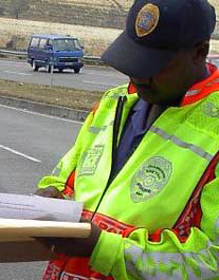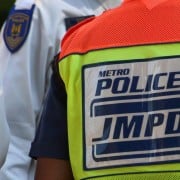|
Getting your Trinity Audio player ready...
|
 By Chantelle Benjamin
By Chantelle Benjamin
Traffic officers who choose not to get involved in corruption face being ostracised, intimidated or edged out of their positions, according to researchers and unions involved with metro police departments.
The situation is unlikely to improve without proper remuneration and training, and the political will to hold officials accountable, the sources say, expressing concern about the endemic and pervasive corruption they are seeing in these departments.
A union official said instead of advising staff against corruption, senior officers were known give them pointers on how not to get caught.
“We are aware of an officer who advised staff not to ask the public for large amounts or to demand the public take them to ATMs, or to do anything that would draw unnecessary attention to themselves, but to rather take what they could [on the side of the road],” said Jack Mokalapa of South African Municipal Workers Union (Samwu).
At the same time, colleagues are suspicious of staff who choose not to actively participate in soliciting bribes or engaging in corrupt activity.
“If anything goes wrong and someone is caught for corruption, staff members immediately think that they were reported by the officer who is not willing to take part in corrupt activities, and in many cases colleagues try to avoid having these honest officers in their team,” Mokalapa said.
“The one way officers, who are not engaged in corrupt activity, gain respect is by keeping quiet about the corruption taking place in their team.”
Where honesty gets you nowhere
Samwu’s spokesperson Tahir Sema said they have seen cases where officers, known to be honest, were dismissed under flimsy pretenses or forced out of their positions by being offered little chance of promotion.
This is supported by research carried out by Gareth Newham, programme head for crime and justice at the Institute for Security Studies (ISS).
“Research suggests a high level of suspensions among staff considered to be honest. They are viewed with a huge amount of suspicion by their colleagues if they refuse to get involved in asking for bribes or corrupt activity.”
Newham said the latest ISS National Victims of Crime Survey shows corruption is rife among metro departments, and that it is getting worse.
The 2011 survey found that corruption among government officials was seen to be increasing, with the biggest culprits being traffic officials.
“Of those asked for a bribe in the previous year, more than half (53%) came from traffic officers to avoid a fine. Worryingly, this type of corruption has increased since 2007 when substantially fewer (33%) of respondents reported this type of corruption,” Newham said.
He said traffic-related bribery was most prevalent in Gauteng (62%), the Western Cape (57%), followed by the Eastern Cape (56%).
Joburg bad, but Tshwane and Ekurhuleni worse
Newham said while the Johannesburg Metro Police Department (JMPD) is problematic when it comes to corruption simply by taking into account its size, he said research suggests that corruption is even more prevalent in Tshwane and Ekurhuleni metro police departments.
Earlier this year Corruption Watch released a report looking into graft in the JMPD. Soon afterwards a JMPD officer was filmed beating two hawkers, amid allegations that one of the hawkers had refused to pay a bribe to ensure his goods were not “confiscated” by officers.
The victims of crime survey revealed that since 2007, corruption was found to have increased with regard to policing, housing allocation, driver’s licences, water or electricity, court-related services and medical care.
Work environment partly to blame
Newham believes that the high level of corruption in the metro police with regard to traffic and bylaw control has a lot to do with their work environment, and follows world trends.
“Firstly a lot of discretionary power is given to relatively junior officers who are out in the field without supervision, and then the nature of their work requires that they deal with money in the form of fines, or in the case of bylaw enforcement, that they confiscate goods being illegally traded.
“It’s a once-off encounter with the person they are soliciting a bribe from. They are unlikely to have further engagement with that person, which makes it a lot easier,” he said.
Newham feels much of the problem is a lack of clearly defined accountability.
“The metros are run by local government who see them largely as a revenue raiser. There is no willingness on the part of local government to change the situation and no real knowledge on how to change it,” he said.
Andrew Faull, in his research for ISS, adds that the metro police force, unlike the police, is dealt with under the same conditions as normal council employees.
“In other words, fast car driving individuals with immense discretionary power are liable to the same disciplinary definitions and punishments as secretaries, human resources managers and ground staff.”
Faull said the anti-corruption units also tend to be reactive.
The difference with Durban
Durban, which has had municipal police since the 1800s, has its anti-corruption unit based in the city’s ombudsman office.
Newham believes this more established unit, with more entrenched systems of accountability, is seeing fewer problems than the units established in 2000.
Samwu’s Tahir Sema believes that the training of metro officers is not at the level it once was. “In general the training of officers is not up to standard. Not just when it comes to ethics, but traffic control and bylaw enforcement as well.”
He and Newham said that management also needs to look at remuneration and performance management.
Sema said: “Staff are badly paid, but expected to risk their lives. In some cases staff have resorted to bribery to substitute their salary to survive. “
Newham said: “For corruption to be truly addressed, there has to be real political will at local government level to take action. It’s not only a problem in South Africa, it’s in the rest of Africa and Europe too. If you don’t do something to address it, it just leads to endemic, systematic and widespread corruption.”
Samwu’s Mokalapa is busy compiling a report on the issues surrounding the JMPD and its corruption to highlight factors contributing to the present situation.








